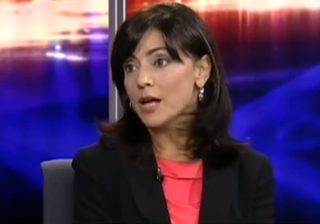A Quote by Elliott Abrams
The Saudis and Emiratis blame all of this on Iran. I think they’d have to grant, that as has been said, that the Houthis are an internally generated movement in Yemen and the Saudis were supposed to be dealing with the Houthis, who started out in essence along their border. So one of the things that we’re seeing is a complete failure of Saudi policy toward Yemen over the past 10 years, but the Saudis totally believe that the reason the Houthis are able to succeed militarily is the amount of money, advice, and guns they are receiving from Iran.
Quote Topics
Related Quotes
I think what is happening is that Houthis and the Iranians have common interests, but there's very little good journalism that's been done to uncover the true extent of that relationship between the Houthis and Iran. But, obviously, I do think that they - they benefit from the rhetoric of the Houthis on the ground. But, also, they do have a connection, but not to the extent that is being covered in the media at the moment by describing them as a Shia militia backed by Iran. I think that's an overstatement.
The Saudis are so happy. People don't understand, the Saudi Arabian government - kingdom - hates Iran. They're scared to death of Iran. That's Shi'a versus Sunni Muslim, and the Iranians are Persians. They're not Arabs. So it's a double whammy. There is no love lost, and the Saudis have been petrified over Barack Obama's peace dance and nuclear dealings with the nation of Iran. They are ecstatic to have Donald Trump.
The ironic factor that is between the Houthis and al-Qaida, that is, they both have strong anti-American sentiment. For example, the slogan of the Houthis is death to America and death to Israel and God curse the Jews and victory to Islam. And besides that, there is very little in common between al-Qaida and the Houthis as far as ideology goes, but they see themselves as having a common enemy, which is America. And America is in a situation, where the Houthis are fighting al-Qaida quite viciously on the ground, yet now the Americans are allied with Saudi Arabia in strikes against the Houthis.
I was the first senior American official to meet with Riyadh's dynamic Deputy Crown Prince Mohammed bin Salman after the Saudi intervention in Yemen in 2015. I reiterated the United States' commitment to defend Saudi Arabia against Houthi aggression and to help press the Houthis back to the bargaining table.
Oil policy, policy toward the United States, policy toward Iran, Bahrain, Yemen, very unlikely, I think, to see significant change. These policies were the policies that had a wide family consensus. The question I think would be if the king becomes sick, whether you have weak Saudi leadership in the Arab world and the Middle East rather than strong Saudi leadership, but I think the fundamental policies will continue, the ones we’re familiar with under King Abdullah.
After the revolution of 1979, Iran embarked on a policy of sectarianism. Iran began a policy of expanding its revolution, of interfering with the affairs of its neighbors, a policy of assassinating diplomats and of attacking embassies. Iran is responsible for a number of terrorist attacks in the Kingdom, it is responsible for smuggling explosives and drugs into Saudi Arabia. And Iran is responsible for setting up sectarian militias in Iraq, Pakistan, Afghanistan and Yemen, whose objective is to destabilize those countries.































